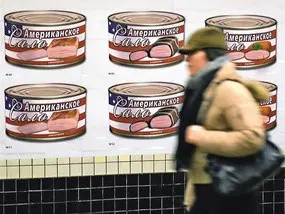Want to try “American salo?” If so, ask Russians where to find it.
A couple of weeks ago, a strange advertisement appeared in Moscow. About 500 billboards on Moscow streets promoted a book by unknown author O. Volia (“freedom” in Ukrainian) called “American salo.”
JOIN US ON TELEGRAM
Follow our coverage of the war on the @Kyivpost_official.
No, it’s not about an American attempt to mass produce and sell salo, a famous Ukrainian dish of salted pork lard. It’s apparently a Russian view of something more sinister.
- Obtain the most recent updates on the Ukraine situation today.
- Find the newest Ukraine news pieces that came out today.
“Food is produced with military techniques of psychological influence and conservation which helps preserving consumer properties without time constraints and guarantees a sense of fullness and pleasure,” the advertisement proclaims. It depicts tin cans painted with the U.S. flag and caption “American salo” on it.
Sound tasty? Well, if anti-American and anti-Ukrainian attitudes appeal to you, this book will prove appetizing.
The campaign was developed by Warriors of Creative, a movement of Russian political technologists and public relations gurus.
Political consultant Mikhail Kovalyov, Warriors of Creative coordinator, acknowledged that the “American salo” campaign is driven by the upcoming Ukrainian presidential election, possibly as early as October. Apparently, there is a strong need by some in Moscow to spoil Victor Yushchenko’s image – and re-election chances – by casting him as an American lackey.
Some media have reported that the “American salo” campaign is ordered by Spravedlivaya Rossiya (Just Russia), which is seen as a loyal Kremlin-created subterfuge led by Federation Council chairman Sergei Mironov to siphon off voters who are disillusioned with United Russia, the “party of power” backed by Russian Prime Minister Vladimir Putin. Spravedlivaya Rossiya supported Putin’s candidate for president, Dmitry Medvedev, in 2007.
Kovalyov worked as a political consultant for Spravedlivaya Rossiya. He denied that the party or the Kremlin is behind the campaign, but refused to identify the backers or its budget.
“It is wrong to think that this is some Kremlin strategy,” Kovalyov said. “Yushchenko opponents [in Ukraine] or even Yushchenko himself could be behind this.”
If Spravedlivaya Rossiya and the Kremlin are behind “American salo,” it wouldn’t be the party’s first experience with anti-American propaganda campaigns. Spravedlivaya Rossiya also reportedly financed a Russian film “Strangers” shot mostly in the English language. The film promotes Russia as a God-chosen peacekeeper on a mission to forgive the United States and Muslim world for their shortcomings. Some have labeled “Strangers” the most anti-American film ever to come out of Russia.
This is at least the third go-around for a variation of the “American salo” promotion. In February, advertisements appeared in Moscow metro stations proposing three types of product: spicy, salo with dill and salo with chocolate. The February advertisement drew criticism in Ukrainian and some Russian media for spreading anti-Ukrainian and anti-American moods among Russians. It was removed by order of the Moscow metro head.
Kovalyov said that the “American salo” book, which is not available in Ukraine and which he refused to provide to the Kyiv Post, is about presidential elections in Ukraine and discusses scenarios for the upcoming election. An online check of major Moscow book stores failed to locate the book. But on March 24, the promoted book suddenly became available, if ordered on-line through Moscow Book House (www.mdk-arbat.ru).
An attempt to launch a propaganda campaign by the same name took place during the 2004 presidential election in Ukraine, when the Kremlin and outgoing President Leonid Kuchma backed Victor Yanukovych against Yushchenko. The resulting election fraud triggered the Orange Revolution and led to Yushchenko’s ultimate victory.
The five-year-old “American salo” campaign actually proposed the introduction of a low-quality, made-in-America salted pork fat in Ukraine. The PR trick was designed to smear candidate Yushchenko in 2004 by, among other things, promoting the American origins of Yushchenko’s wife, Kateryna.
The 2009 re-emergence of “American salo” – in book form – appears also directed against Yushchenko. “Putin perceives Yushchenko’s 2004 victory as his personal defeat and secondly, Yushchenko’s attempts to protect Ukrainian national interests anger Russia’s power,” said Andriy Parubiy, an Our Ukraine pro-presidential parliamentarian.
This time around, however, the political world has changed. Yushchenko is deeply unpopular and many give him a slim chance for re-election, calling into question the need for such PR techniques.
“American salo” wouldn’t be the first anti-Ukrainian book published in Russia. In 2009, Folio publishing house released Maxim Kalashnikov’s “Independent Ukraine: Failure of a Project.” Its main idea is that Ukraine is divided between its Ukrainian-speaking western and Russian-speaking eastern parts and tensions are deepening. Ukraine is portrayed as the next Yugoslavia, on the verge of breaking up into pieces. Other fantasy books by Russian authors about wars on Ukraine’s territory have also been published in Russia.
Russia needs an external enemy to distract people’s attention from the nation’s internal problems, Taras Beresovets, director of Polittech political consulting firm, said. Russia’s leaders have evidently succeeded in fomenting xenophobic attitudes. In January, according to the respected Levada Center polling firm, 62 percent of Russians described themselves as having a bad attitude towards Ukraine.
But PR campaigns such as “American salo” are not decisive in forming public attitudes, said Denis Volkov, a Levada Center analyst in Moscow. Mass media, especially television, are the primary sources of information for Russians. “Russian TV channels are controlled and present the official Russia position at a time when people’s trust of top politicians is high,” he added.
Some anti-Ukrainian books printed in Russia this year:
O. Volia “American Salo.”
Georgiy Savitsky “Battlefield Ukraine. The broken trident.”
Maxim Kalashnikov, Sergei Buntovsky “Independent Ukraine: Failure of a Project.”
Alexander Sever “The Russian-Ukrainian wars.”
Fyodor Berezin “War 2010. The Ukrainian front.”
You can also highlight the text and press Ctrl + Enter




